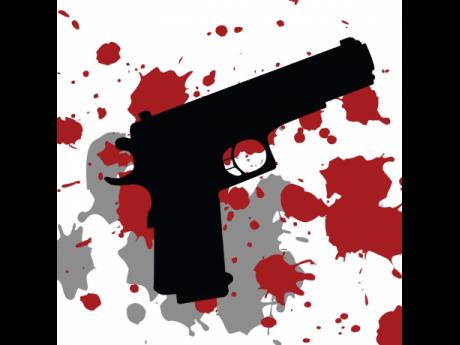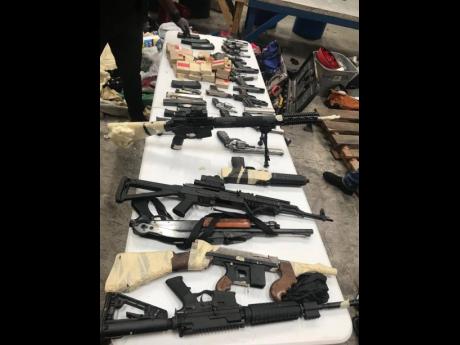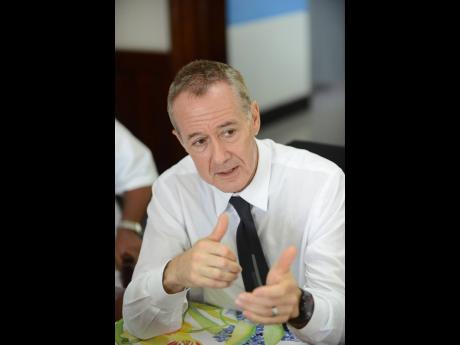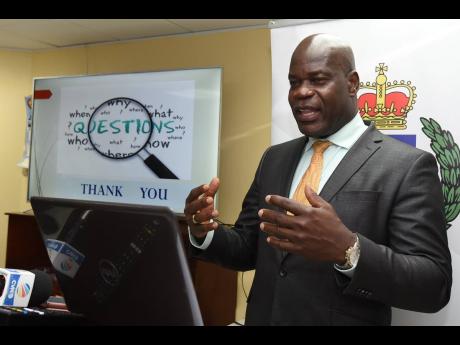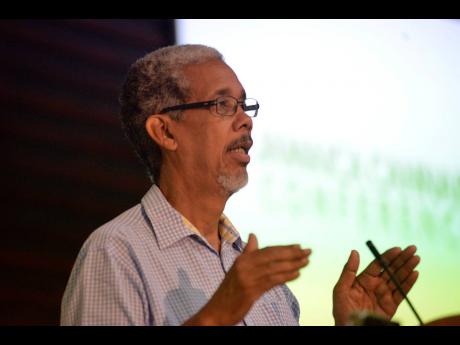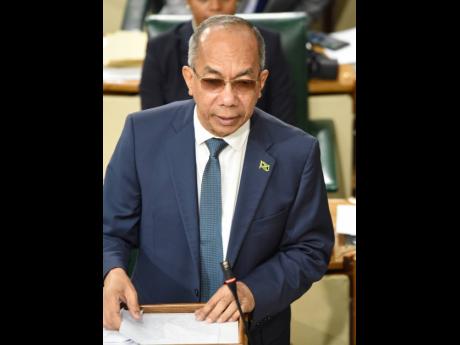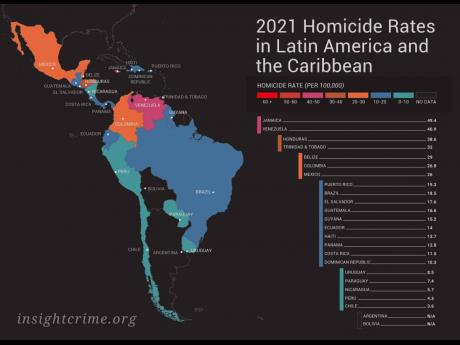Bloodbath
• Jamaica records 45,000 murders since Independence • ‘Kid glove’ approach cannot deal with current crime monster, police declare
More than 45,000 people have been murdered in Jamaica since the country gained political Independence 60 years ago, police statistics have revealed. A review of the figures shows that nearly two-thirds of those killings – or 29,642 – happened since...
More than 45,000 people have been murdered in Jamaica since the country gained political Independence 60 years ago, police statistics have revealed.
A review of the figures shows that nearly two-thirds of those killings – or 29,642 – happened since the year 2000, blamed largely on a gun culture largely ushered in by the political struggles of the 1970s.
The death toll comes as Jamaica gets ready to mark another milestone since taking charge of its political affairs on August 6, 1962.
“When you look at the type of criminality, I think some of it borders on terrorism, domestic terrorism,” declared Deputy Police Commissioner Fitz Bailey.
Upwards of 80 per cent of the 45,590 murders recorded locally since 1962 involved the use of a gun, according to police data.
Jamaica’s homicide count remained relatively low for the first 10 years after Independence before its “inexorable” rise around 1972, said noted academic Professor Anthony Clayton.
From a low of 63 in 1962 to a high of 188 in 1972, a total of 1,229 murders were recorded over the 10-year period, according to police data.
“The gun culture developed in the era of political violence in the 1970s and ‘80s when politicians were involved in running guns into the country and arming their respective factions,” charged Clayton, Alcan professor of Caribbean Sustainable Development at The University of the West Indies.
The 1970s and ‘80s marked the escalation of tensions in the ideological battle between the country’s two main political parties, the left-leaning People’s National Party (PNP) and right-wing Jamaica Labour Party (JLP).
A total of 889 people were murdered across Jamaica in 1980, a majority of them attributed to the fiercely contested parliamentary election that year.
TRUTH AND RECONCILIATION COMMISSION
Paul Burke, a political firebrand at the time, said “of course”, there is truth to the assertion that amid the rising tensions, politicians aligned to the PNP and JLP distributed guns to their supporters for “protection and control”.
Burke, a former PNP general secretary, responded “yes, but I won’t discuss that”, when asked how the guns were delivered to supporters.
While claiming that it is “widely documented” that the arming of political supporters began in the JLP enclave of Kingston Western, Burke acknowledged that some within his party followed suit.
“To deny it would be to deny what many people know as fact, that there were politicians – whatever their motives were – who came under pressure and may not have handed out a gun personally, but made sure that people had resources so that they could protect themselves,” he told The Sunday Gleaner on Friday.
JLP General Secretary Dr Horace Chang acknowledged that violence between political factions reached unacceptable levels in the ‘70s and ‘80s, but said it declined after the 1980 general election.
“The story has persisted because it is convenient and allows us not to examine the deep social inequalities and neglect of our vulnerable communities that have created the ecosystem for the evolution of violence and brutality,” said Chang, who is also the minister of national security.
His PNP counterpart, Dr Dayton Campbell, also sidestepped the issue, saying, “I am not aware of what you speak and I won’t speculate.”
Burke said establishing a truth and reconciliation commission in Jamaica, similar to what South Africa did to try and uncover human rights abuses that occurred during the apartheid era, would not yield answers.
He noted, too, that some of the people who were directly involved are no longer around to “tell their version of the truth, as skewed as it may have been”.
“I am speaking to you because I believe that by remaining silent and making no comment doesn’t help the conversation and the understanding [of the issues],” Burke said.
But with the subsequent narrowing of the ideological divide, armed thugs no longer depended on politicians, Clayton suggested.
“Decades of corruption and politically orchestrated violence established the problem, but it is now self-sustaining,” said the professor.
Burke insisted, however, that Jamaica’s gun culture was not solely a by-product of the country’s political history.
He argued that by the 1990s, deportees and others who felt the need to protect and control communities were bringing illegal guns into the island.
“Many deportees were not criminals, but there was a good amount of them who came back with the gun culture and that is what mushroomed in Jamaica. I have no doubt about that,” Burke insisted.
‘PSYCHOPATHS AND SOCIOPATHS’
A total of 7,621 people were killed during the decade of the 1990s, according to the Jamaica Constabulary Force. But by the end of the next decade, that figure almost doubled to 14,865.
Another 14,061 killings were recorded by the police between 2011 and the end of June this year. The 716 reported murders between January and June 26 this year represents a 1.3 per cent year-on-year increase.
Bailey, the deputy commissioner who has responsibility for crime and security, believes globalisation – along with the lottery scam and other emerging forms of criminal activities – has helped to create “psychopaths” and “sociopaths”.
And he does not believe that Jamaica’s legislative framework has kept pace.
“When you look at some of these guys that commit murders, serial murders, we don’t even have a designation for that. Contract killers … when we have adequate intelligence, how do we treat with them?” he questioned.
Bailey insisted that the “kid-glove” approach no longer applies to aspects of Jamaica’s crime problem.
“There are some things that you just have to use hardcore policing to deal with. That’s the reality; there is no two ways about it,” he told The Sunday Gleaner.
“There are some of these guys who, in my view, are beyond redemption and our justice system is challenged to deal with them because they have money, they have support, and they can influence a lot of people,” he said.
However, while acknowledging that criminals have “outgrown” the political space and developed transnational enterprises, human rights advocate Arlene Harrison Henry cautioned against a return to hardcore policing strategies.
Without naming anyone, Harrison Henry, the former public defender, warned that a narrative is being developed which suggests that freedom, security of person and the protection of privacy must be “sacrificed” to catch criminals.
She argued that this was being done “deliberately to pitch personal freedom, which is one of the cornerstones of any democracy, against crime-fighting”.
“It is not the human rights and the civil liberties of people that have caused criminality,” said Harrison Henry.
“We have seen the development and mushrooming of crime and the inextricable link between crime and politics, crime and political parties and nobody has sought to uncover and unearth that.”
According to the 2022 report from Insight Crime, for the second year in a row, Jamaica had the highest murder rate in Latin America and the Caribbean for 2021, with 1,463 homicides translating to 49.4 per 100,000 people. This is an increase from the 46.5 per 100,000 for 2020, with recorded homicides of 1,301.

